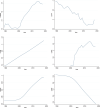Does life expectancy, death rate and public health expenditure matter in sustaining economic growth under COVID-19: Empirical evidence from Nigeria?
- PMID: 32904937
- PMCID: PMC7460965
- DOI: 10.1002/pa.2302
Does life expectancy, death rate and public health expenditure matter in sustaining economic growth under COVID-19: Empirical evidence from Nigeria?
Abstract
The current health pandemic that has plagued the global of which the global south-Nigeria is not insulated from is the premise for this empirical investigation. The present study relies on recent annual time-series data to conceptualize the hypothesized claim via Pesaran's Autoregressive distributed lag techniques. Empirical findings from the bounds test traces the long-run relationship between public health expenditure and economic growth over the study span. However, unlike previous studies, we introduce life expectancy and death rates in the model framework. Although health expenditure is not significant, empirical results show that a 1% increase in life expectancy and death rate increases and decreases economic growth by 3.85 and 1.84%, respectively. This suggests the need for Health Policymakers in Nigeria to implement active strategies that reduce the death rate, which is a blueprint for active engagement in the face of a global pandemic such as COVID-19.
© 2020 John Wiley & Sons Ltd.
Figures
References
-
- AFDB , 2011. Africa Economic outlook 2011. African Development Bank Annual Report.
-
- Ahmad, R. , & Hasan, J. (2016). Public health expenditure, governance and health outcomes in Malaysia. Jurnal Ekonomi Malaysia, 50(1), 29–40.
-
- Alvarado, R. , Iniguez, M. , & Ponce, P. (2017). Foreign direct investment and economic growth in Latin America. Economic Analysis and Policy, 56, 176–187. 10.1016/j.eap.2017.09.006 - DOI
-
- Bakare, A. S. , Sanmi, O. , & S, C. A. B . (2011). Health care expenditure and economic growth in Nigeria: An Empirical Study, 2(2), 83–87.
LinkOut - more resources
Full Text Sources


